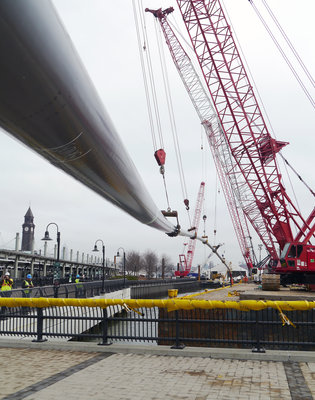JERSEY CITY – Spectra Energy has notified Jersey City that it will begin testing its gas pipeline on Monday, Oct. 7 in preparation for full pipeline operations on Nov. 1.
According to the city, nitrogen will be used for initial tests. Beginning on Oct. 16, Spectra will begin to run natural gas through the pipeline, at low pressure at first then at full pressure beginning on Nov. 1.
According to information Spectra provided to the city, natural gas will be released into the atmosphere at two valve stations, one at Pacific Avenue near Grand Street and another location at 17th and Coles streets.
According to the city, Spectra is required by state and federal law to make notification of any planned gas release to the Jersey City Police Department, the Jersey City Fire Department, and property owners near these valve stations.
“Since 2010 when we first heard about this proposed pipeline, the entire city government and the vast majority of our residents and business owners have opposed the Spectra natural gas pipeline, as clearly this high-pressure pipeline does not belong in [an area] the size and density of Jersey City,” said city spokeswoman Jennifer Morrill. “We are extremely concerned about the immediate and long-range safety hazards this pipeline poses and the Department of Public Safety will continue to monitor and investigate these operations.”
Morrill added that the Jersey City Department of Public Safety is monitoring these operations and the Fire Department will assign a fire company to be on standby for each release.
Despite opposition to Spectra Energy’s natural gas pipeline among many Jersey City residents and elected officials, Spectra has for months been on track to have the pipeline completed and operational by November.
For more than two years, the city tried to block construction of the pipeline, which is about 30 inches in diameter and will have a possible pressure of 1,200 pounds per square inch, arguing that it is the first of its magnitude to be built in a densely-populated urban area near several transit hubs such as the Holland Tunnel, the New Jersey Turnpike, and the Hoboken NJ Transit and PATH terminals.
After the Federal Energy Regulatory Commission (FERC) approved Spectra Energy’s pipeline project in May 2012, last May, Jersey City filed an appeal asking the agency to reconsider. This appeal was denied and the city filed a Petition for Review last December.
In its petition the city argues that since FERC’s annual budget comes from fees it collects from the energy industry it regulates, and its decisions are biased in favor of that industry and do not adequately protect communities like Jersey City from problems that may arise from natural gas pipelines and other energy-related infrastructure.
“We are continuing our lawsuit, which is pending in federal district court in Washington, D.C., in our efforts to protect the residents of Jersey City,” Morrill said.
Once the pipeline is in operation, some legal observers have said it seems unlikely the federal government would force Spectra to suspend operations.
Most of the natural gas that is to be transported through the pipeline will be used to meet the energy needs of Con Edison customers in New York, although Spectra has said it will also supply energy to power facilities operated by Bayonne Plant Holding and boilers at the International Matex Tank Terminals, also in Bayonne.
The pipeline includes 19.8 miles of new and replacement pipes, six new stations, and other related modifications in Jersey City, Bayonne, and Linden, New Jersey.
Spectra spokeswoman Marylee Hanley has said the pipeline is safe and is a “critical infrastructure project” that will deliver “clean and affordable natural gas to the New Jersey and New York regions.” – E. Assata Wright
Our Digital Archive from 2000 – 2016
